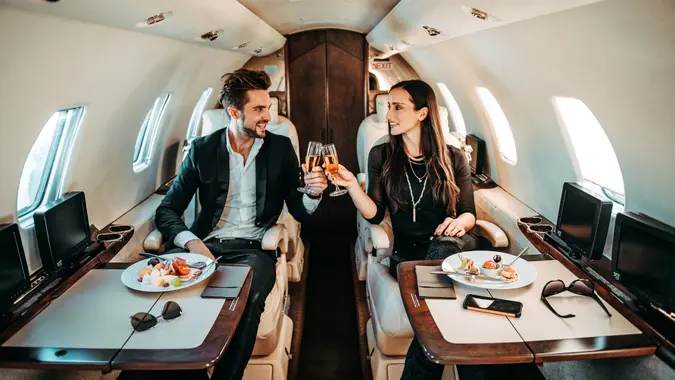Should You Fly First or Business Class Domestically? Here’s How To Decide

Commitment to Our Readers
GOBankingRates' editorial team is committed to bringing you unbiased reviews and information. We use data-driven methodologies to evaluate financial products and services - our reviews and ratings are not influenced by advertisers. You can read more about our editorial guidelines and our products and services review methodology.

20 Years
Helping You Live Richer

Reviewed
by Experts

Trusted by
Millions of Readers
When it comes to domestic travel, the choice between flying first or business class and sticking with economy can be a puzzler.
Sure, the allure of extra legroom, superior service and that oh-so-coveted space away from the crowd is tempting. But is it worth the extra bucks?
Let’s break it down, looking at the various factors that might sway your decision.
Flight Duration
Before splurging on that plush first-class seat, think about your how long your flight will be.
If you’re jetting across the country and facing a flight north of four hours, the investment in comfort might just be worth it. Those extra inches of legroom, enhanced meal options and the peace that comes with a quieter cabin can transform a cross-country trek into a journey of joy.
However, if your destination is only a hop, skip and a jump away, say under two hours, you might not get to enjoy the benefits of first or business class before it’s time to land.
Destination
Consider the purpose of your trip. Heading to a high-stakes business meeting where first impressions count? Arriving refreshed and relaxed might just give you the edge you need.
In this scenario, the calm of a premium cabin can be seen as an investment in your professional poise. On the flip side, if you’re off to a casual weekend getaway, the extra expense might not align with the laid-back vibe you’re chasing.
Perks Aplenty
Flying business or first class is not just about the seat; it’s about the experience.
Airlines often woo first and business class passengers with perks like priority boarding, increased baggage allowances and access to exclusive lounges. These benefits can transform your travel experience, offering a serene start to your journey.
Weigh these perks against the cost – if the idea of a quiet lounge to work or unwind in before your flight sounds like bliss, the upgrade might be calling your name.
Airline Matters
Not all first and business classes are made the same. Some airlines go all out with lie-flat seats and top-tier dining, while others offer a more subdued version of luxury.
Research is your best friend here. Look into what’s actually being offered on your specific route and airline. Websites and traveler reviews can be goldmines of information, helping you decide if that upgrade is truly worth it.
Travel Credit Card Benefits
If you’re a holder of a travel credit card, dig into those perks too. Some cards offer complimentary upgrades, access to lounges or even enough reward points to cover the cost of your upgrade.
This could significantly reduce the financial impact of your decision to fly higher class. However, be mindful of the opportunity cost – those points could potentially be used for another trip if you save them.
Calculating the Value
Ultimately, you’ll have to decide based on your own personal cost-benefit analysis. Calculate the difference in fare and weigh it against the tangible and intangible benefits you’re getting.
If the perks, comfort and potential for productivity or relaxation significantly outweigh the cost, your decision is made. But if the scales don’t tip decidedly in favor of the upgrade, your wallet will thank you for sticking with economy.
Editor's note: This article was produced via automated technology and then fine-tuned and verified for accuracy by a member of GOBankingRates' editorial team.
 Written by
Written by  Edited by
Edited by 

























